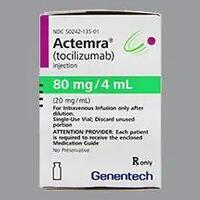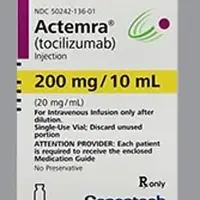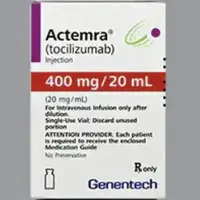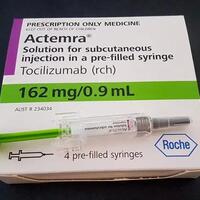Generic name: tocilizumab
Drug class: Interleukin inhibitors
Dosage form: intravenous (infusion) injection, subcutaneous injection
Availability: Prescription only
Pregnancy & Lactation: Risk data available
Brand names: Actemra actpen, Tocilizumab, Tofidence
What is Actemra?
Actemra (tocilizumab) is a FDA approved biological medicine that is given by intravenous infusion or injection under the skin to treat specific patients with COVID-19, rheumatoid arthritis, giant cell arteritis, scleroderma, polyarticular or systemic juvenile idiopathic arthritis, and severe cytokine release syndrome.
Actrema was FDA approved to treat COVID-19 on December 21, 2022, for specific adult patients. Pediatric patients (aged 2 years to 18 years) with COVID-19 still have access to Actrema under emergency use authorization (EUA).
Actrema is a monoclonal antibody that blocks a protein in your body called interleukin-6 (IL-6). If this protein is activated, it causes your immune system to be overactive which results in inflammation and the signs and symptoms of autoimmune disease. As Actrema blocks the interleukin-6 receptor, this is how it is thought to reduce the immune system from being overactive, so there is less inflammation and a reduction in the signs and symptoms of autoimmune diseases.
At a more technical level the mode of action (MOA) of Actrema is that it binds to IL-6 receptors (sIL-6R and mIL-6R) which have been shown to inhibit IL-6-mediated signaling through these receptors. Interleukin-6 is a pro-inflammatory cytokine that is made by a variety of cell types including T- and B-cells, lymphocytes, monocytes and fibroblasts.
Actemra can be used with other medications as part your complete treatment.
What is Actemra used for?
Actemra is indicated for the treatment of:
- Rheumatoid Arthritis (RA) Adult patients who have moderately to severely active rheumatoid arthritis and have tried one or more Disease-Modifying Anti-Rheumatic Drugs (DMARDs) but have had an inadequate response to them.
- Giant Cell Arteritis (GCA) Adult patients with giant cell arteritis.
- Systemic Sclerosis-Associated Interstitial Lung Disease (SSc-ILD) Adult patients with systemic sclerosis-associated interstitial lung disease to slow the rate of decline in pulmonary function.
- Polyarticular Juvenile Idiopathic Arthritis (PJIA) Patients 2 years of age and older who have active polyarticular juvenile idiopathic arthritis.
- Systemic Juvenile Idiopathic Arthritis (SJIA) Patients 2 years of age and older who have active systemic juvenile idiopathic arthritis.
- Cytokine Release Syndrome (CRS) Adults and pediatric patients 2 years of age and older who have chimeric antigen receptor (CAR) T cell-induced severe or life-threatening cytokine release syndrome.
- COVID-19: FDA approved for adult patients that are hospitalized with COVID-19 and who are receiving systemic corticosteroids and require supplemental oxygen, non-invasive or invasive mechanical ventilation, or extracorporeal membrane oxygenation (ECMO).
- COVID-19: Emergency Use Authorisation for pediatric patients (2 years old to less than 18 years of age) with COVID-19 who are receiving systemic corticosteroids and require supplemental oxygen, non-invasive or invasive mechanical ventilation, or ECMO.
Related/similar drugs
Simponi, Ofev, prednisone, methotrexate, Paxlovid, hydroxychloroquine, HumiraWarnings
Actemra affects your immune system. You may get infections more easily, even serious or fatal infections. Call your doctor if you have a fever, chills, aches, tiredness, cough, skin sores, diarrhea, weight loss, or burning when you urinate.
Actemra may also cause a perforation (a hole or tear) in your stomach or intestines. Tell your doctor if you have a fever and stomach pain with a change in your bowel habits.
Actemra may also cause liver problems. Tell your doctor right away if you have right-sided stomach pain, vomiting, loss of appetite, tiredness, dark urine, clay-colored stools, or yellowing of your skin or eyes.
Before you start treatment with Actemra, your doctor may perform tests to make sure you do not have tuberculosis or other infections. While using Actemra, you may need frequent medical tests.
How should I take Actemra
Use Actemra exactly as prescribed by your doctor. Follow all directions on your prescription label and read all medication guides or instruction sheets.
Before you use Actemra, your doctor may test you for tuberculosis or other infections.
Actemra is injected under the skin or into a vein. This medicine is usually given every 1 to 4 weeks for most conditions. For CRS, only one dose is usually given.
When injected into a vein, this medicine is given slowly for about 1 hour.
Read and carefully follow any Instructions for Use provided with the medicine. Ask your doctor or pharmacist if you don't understand how to use an injection.
Prepare an injection only when you are ready to give it. Call your pharmacist if the medicine looks cloudy, has changed colors, or has particles in it.
Your healthcare provider will show you where to inject Actemra. Do not inject into the same place two times in a row.
Do not reuse a needle, syringe, or autoinjector. Place them in a puncture-proof "sharps" container and dispose of it following state or local laws. Keep out of the reach of children and pets.
You may get infections more easily, even serious or fatal infections. You will need frequent medical tests.
If you've had hepatitis B, it may come back or get worse. You may need liver function tests while using this medicine and for several months after you stop.
Tell your doctor if you have a planned surgery.
Use all your medications as directed. Do not change your dose or stop using a medicine without your doctor's advice.
Store Actemra injection in the original carton in a refrigerator. Protect from moisture and light. Do not freeze. Throw away any prefilled syringes not used before the expiration date on the medicine label.
After removed from the refrigerator, the prefilled syringe and autoinjector can be stored up to 2 weeks at or below 86 F (30 C). Throw away the prefilled syringe or autoinjector after one use, even if there is still medicine left inside.
Actemra can have long-lasting effects on your body. You may need certain medical tests every 6 months after you stop using this medication.
Dosing information
Usual Adult Dose of Actemra for Rheumatoid Arthritis:
IV: 4 mg/kg IV as a 60-minute single drip infusion once every 4 weeks, followed by an increase to 8 mg/kg IV given once every 4 weeks as a 60-minute single drip infusion based on clinical response, doses exceeding 800 mg per infusion are not recommended
SUBCUTANEOUS:
-Patients less than 100 kg: 162 mg subcutaneously every other week, followed by an increase to every week based on clinical response
-Patients 100 kg or greater: 162 mg subcutaneously every week
Comments:
-This drug may be used as monotherapy or concomitantly with methotrexate or other non-biologic DMARDs.
-When transitioning from IV to subcutaneous, give the first subcutaneous dose instead of the next IV dose.
Use: For the treatment of adult patients with moderately to severely active rheumatoid arthritis who have had an inadequate response to one or more Disease-Modifying Anti-Rheumatic Drugs (DMARDs)
Usual Adult Dose of Actemra for Giant Cell Arteritis:
SUBCUTANEOUS:
-In combination with a tapering course of glucocorticoids, 162 mg subcutaneously once a week
-Based on clinical considerations, 162 mg subcutaneously once every other week in combination with a tapering course of glucocorticoids may be prescribed
Comments:
-This drug may be used alone following discontinuation of glucocorticoids.
Use: For the treatment of giant cell arteritis (GCA) in adult patients
Usual Adult Dose for Cytokine-Associated Toxicity:
IV:
-Weight less than 30 kg: 12 mg/kg IV over 60 minutes
-Weight 30 kg or above: 8 mg/kg IV over 60 minutes
Comments:
-Doses exceeding 800 mg per infusion are not recommended.
-If no clinical improvement occurs after the first dose, up to 3 additional doses may be administered.
-The interval between consecutive doses should be at least 8 hours.
-This drug may be used alone or in combination with corticosteroids.
-Patients with severe or life-threatening CRS frequently have cytopenias or elevated ALT or AST due to the underlying malignancy, preceding lymphodepleting chemotherapy or the CRS.
-Subcutaneous route not approved for CRS.
Use: For the treatment of chimeric antigen receptor (CAR) T cell-induced severe or life-threatening cytokine release syndrome in adults and pediatric patients 2 years of age and older
Usual Pediatric Dose for Juvenile Idiopathic Arthritis:
Polyarticular Juvenile Idiopathic Arthritis (PJIA):
IV formulation: 2 years or older
-Weight less than 30 kg: 10 mg/kg IV over 60 minutes every 4 weeks
-Weight 30 kg or more: 8 mg/kg IV over 60 minutes every 4 weeks
SUBCUTANEOUS formulation:
-Weight less than 30 kg: 162 mg once every 3 weeks
-Weight 30 kg or more: 162 mg once every 2 weeks
Systemic Juvenile Idiopathic Arthritis (SJIA):
IV formulation: 2 years or older:
-Weight less than 30 kg: 12 mg/kg IV over 60 minutes every 2 weeks
-Weight 30 kg or more: 8 mg/kg IV over 60 minutes every 2 weeks
SUBCUTANEOUS formulation:
-Weight less than 30 kg: 162 mg subcutaneously once every 2 weeks
-Weight 30 kg or more: 162 mg subcutaneously once a week
Comments:
-This drug may be used as monotherapy or concomitantly with methotrexate.
-Weight may fluctuate; therefore, dose adjustments should not be based on a single weight measurement.
-When transitioning from IV to subcutaneous, administer the first subcutaneous dose instead of the next IV dose.
Uses:
-For the treatment of active polyarticular juvenile idiopathic arthritis (PJIA) in patients 2 years of age and older
-For the treatment of active systemic juvenile idiopathic arthritis (SJIA) in patients 2 years of age and older
Usual Pediatric Dose for Cytokine-Associated Toxicity:
IV:
-Weight less than 30 kg: 12 mg/kg IV over 60 minutes
-Weight 30 kg or above: 8 mg/kg IV over 60 minutes
Comments:
-Doses exceeding 800 mg per infusion are not recommended.
-If no clinical improvement occurs after the first dose, up to 3 additional doses may be administered.
-The interval between consecutive doses should be at least 8 hours.
-This drug may be used alone or in combination with corticosteroids.
-Patients with severe or life-threatening CRS frequently have cytopenias or elevated ALT or AST due to the underlying malignancy, preceding lymphodepleting chemotherapy or the CRS.
-Subcutaneous route not approved for CRS.
Use: For the treatment of chimeric antigen receptor (CAR) T cell-induced severe or life-threatening cytokine release syndrome in adults and pediatric patients 2 years of age and older
For dosage information on Systemic Sclerosis-Associated Interstitial Lung Disease and
Polyarticular Juvenile Idiopathic Arthritis click on the dosage link below.
For more detailed dosage information other conditions click on the link below.
Before Taking
You should not use Actemra if you are allergic to Actemra.
Tell your doctor if you have any signs of infection such as fever, chills, cough, body aches, tiredness, open sores or skin wounds, diarrhea, stomach pain, weight loss, painful urination, or coughing up blood.
Tell your doctor if you've had or been exposed to tuberculosis, or if you recently traveled. Some infections are more common in certain parts of the world, and you may have been exposed during travel.
To make sure Actemra is safe for you, tell your doctor if you have:
-
an active or chronic infection;
-
liver disease;
-
diverticulitis, ulcers in your stomach or intestines;
-
a nerve-muscle disease such as multiple sclerosis;
-
diabetes;
-
HIV, or a weak immune system;
-
hepatitis B (or if you are a carrier of the virus);
-
cancer; or
-
if you have received or are scheduled to receive any vaccines.
Using Actemra may increase your risk of developing certain types of cancer. Ask your doctor about this risk.
Tell your doctor if you are pregnant or breastfeeding.
If you are pregnant: Tell your baby's doctor if you used Actemra during pregnancy. It could affect your baby's vaccination schedule during the first months of life. Your name may be listed on a pregnancy registry to track the effects of tocilizumab on the baby.
What happens if I miss a dose?
Call your doctor for instructions if you miss a dose.
What happens if I overdose?
Seek emergency medical attention or call the Poison Help line at 1-800-222-1222.
What should I avoid while using Actemra?
While using Actemra: Do not receive a "live" vaccine or you could develop a serious infection. The vaccine may not work as well and may not fully protect you from disease.
-
Live vaccines include measles, mumps, rubella (MMR), polio, rotavirus, typhoid, yellow fever, varicella (chickenpox), zoster ( shingles), and nasal flu (influenza) vaccine.
-
You may still be able to receive a yearly flu shot, or an "inactivated" or other vaccine to prevent diseases such as hepatitis, meningitis, pneumonia, shingles, HPV, or whooping cough.
-
Ask your doctor before getting any vaccine.
Avoid being near people who are sick or have infections. Tell your doctor at once if you develop signs of infection.
Actemra side effects
Get emergency medical help if you have signs of an allergic reaction to Actemra: hives; chest pain, difficulty breathing, feeling like you might pass out; swelling of your face, lips, tongue, or throat.
Call your doctor at once if you have:
-
severe stomach cramps, bloating, diarrhea or constipation;
-
unusual bleeding - nosebleeds, bleeding gums, abnormal vaginal bleeding, any bleeding that will not stop, blood in your urine or stools, coughing up blood or vomit that looks like coffee grounds;
-
liver problems - loss of appetite, right-sided stomach pain, vomiting, confusion, dark urine, clay-colored stools, jaundice (yellowing of the skin or eyes);
-
signs of infection - fever, chills, aches, skin sores, diarrhea, burning when you urinate;
-
signs of tuberculosis: cough, shortness of breath, night sweats, loss of appetite, weight loss, and feeling very tired; or
-
signs of perforation (a hole or tear) in your stomach or intestines - fever, ongoing stomach pain, change in bowel habits.
Common Actemra side effects may include:
-
runny or stuffy nose, sinus pain, sore throat;
-
headache;
-
increased blood pressure;
-
abnormal liver function tests; or
-
pain, swelling, burning, or irritation where an injection was given.
This is not a complete list of side effects and others may occur. Call your doctor for medical advice about side effects. You may report side effects to FDA at 1-800-FDA-1088.
See more: Actemra Side EffectsWhat other drugs will affect Actemra?
Sometimes it is not safe to use certain medications at the same time. Some drugs can affect your blood levels of other drugs you take, which may increase side effects or make the medications less effective.
Tell your doctor about all your other medicines, especially other medicines to treat rheumatoid arthritis, such as:
-
abatacept, etanercept;
-
anakinra; or
-
adalimumab, certolizumab, golimumab, infliximab, or rituximab.
This list is not complete and many other drugs may interact with tocilizumab. This includes prescription and over-the-counter medicines, vitamins, and herbal products. Not all possible drug interactions are listed here.







